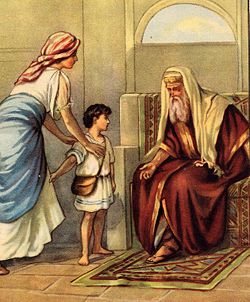My elder sister and I are quite different.
For instance, she has no idea how to be crafty. When she wanted something, she came straight out and asked my parents for it. They would consider the matter (or immediately respond), often saying, "Well . . . you don't really need it . . ."
Then she would watch in surprise how I would "magically" be showered with all sorts of things. She would claim favoritism, but I explained it to her.
"The secret it is, my sweet, that you don't ask. You stay quiet, yet grateful, biding your time. Then, eventually, they say, 'Mammelah, isn't there something you want?' and I reply, 'Oh, no, I have everything I could possibly want. No need to get me anything.' And then what happens? 'Oy, what a gittechkeh,' and out comes the wallet."
Well, if it works with my parents, why not with God?
Maybe we are going about it the wrong way. Maybe we aren't supposed to be asking. Maybe, we are supposed to be thanking.
 Take, for instance, the story of Channah. I always thought Elkana was a trifle clumsy when he says to her, "Channelah, aren't I better than ten sons?" But there is a reason why that statement is in the text. It must have meant something significant, rather than a husband's awkward attempt to comfort his barren wife.
Take, for instance, the story of Channah. I always thought Elkana was a trifle clumsy when he says to her, "Channelah, aren't I better than ten sons?" But there is a reason why that statement is in the text. It must have meant something significant, rather than a husband's awkward attempt to comfort his barren wife.
According to Yemima Mizrachi, what it did was change Channah's perspective.
 Rather than weep for her unfulfilled womb, she rejoiced in her happy marriage. She sang her gratitude to God. And, well, the rest is history.
Rather than weep for her unfulfilled womb, she rejoiced in her happy marriage. She sang her gratitude to God. And, well, the rest is history.

Maybe we are going about it the wrong way. Maybe we aren't supposed to be asking. Maybe, we are supposed to be thanking.

According to Yemima Mizrachi, what it did was change Channah's perspective.
"Listen, Channah," her husband tells her, "you can't keep crying over what you don't have. Start singing about what you do have."
"But what do I have?"
"You have me. Walk around all day singing."
"OK, I've tried all the segulot; I'll try that too." And Channah starts walking around the house, singing: "Elkana is better for me that ten sons. Elkana is better for me than ten sons."
And Shmuel was born.
Do you want more? Then sing about what you do have. You have so much—sing!


I don't know, that seems kind of simplistic the way you put it. Plus, not exactly what happened, it was due to her intense davening and pleading (so much so that she was thought to be drunk, I don't doubt that tears were involved) that she became pregnant.
ReplyDeleteNot how I put it. How Yamima Mizrachi put it. That's her verbatim.
ReplyDeleteWell, the drunk part was because she was davening silently, a concept which had not yet taken off.